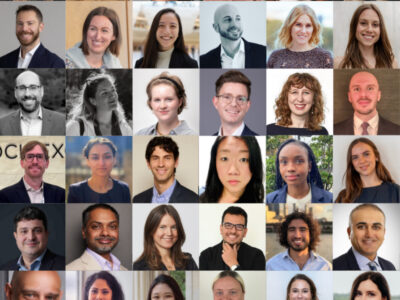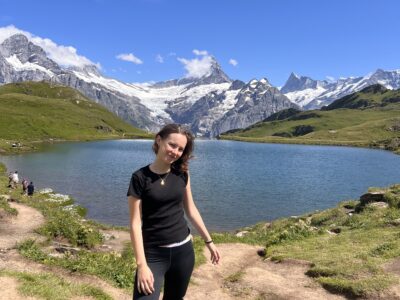By Chandler Precht
| Today, two students from Columbia’s Undergraduate Sustainable Development Program, Abigail Sharkey and Sam Goldberg, were inducted into the Phi Beta Kappa honor society. We caught up with them about their experiences in the program, dedication to environmental protection, and goals for the future.
Q&A with Abigail and Sam What drew you to the Sustainable Development program?
Sam: The summer after my freshman year, I was working as a cashier/line cook at a What do you think is the most important sustainability/environmental policy challenge that you have learned about and why? A: Climate change. Not only does it have widespread, global effects, but the politicization of the issue has led to a situation where many in the United States deny the threat of climate change and there is insufficient legislation to address the issue at the federal level. Still, I am inspired by the actions of people around the world and the passion of my classmates in the program. I hope that we can be a part of the solution. S: As you discuss in many SDEV courses, the people who are most affected by unsustainable practices are often marginalized in environmental decision-making. Wealthy countries need to acknowledge the global destruction their extractive industries have produced — which many are not apt to do — and devise a plan for disbursing reparations to the communities whose lands have been destroyed or who are now vulnerable to climate change-related extreme weather events. Moreover, in crafting future policy, the voices of those who shoulder the greatest environmental risk need to be centered, which is complicated because it requires addressing not only environmental concerns but also the social injustices that create unequal political power in the first place. What skills and tools have you acquired through the program? A: My favorite aspect of the Sustainable Development program is how often I feel like I am learning practical, applicable skills. In my practicum, we learned from industry experts how to best develop concrete strategies to encourage sustainability in organizations. Through my thesis, I improved my research, analysis, and writing skills and gained experience managing a large, long-term project. I think that these skills will serve me well whether I pursue a career in the sustainable development field or elsewhere. S: I think the most important skill that everyone learns in the Sustainable Development program is interdisciplinary thinking. By learning the different methodological approaches of various disciplines, I have grown more confident in my ability to understand a given problem in greater complexity and from a variety of stakeholder perspectives. In terms of hard skills, I took the course GIS for Sustainable Development and learned how to use ArcGIS to perform spatial analysis. I’ve been in love with mapmaking ever since. Has your idea of what sustainable development is, and how to achieve it, changed since you started the program? A: My idea of sustainable development has definitely changed. At first, I think I held a limited view of sustainability, focusing just on concepts like energy, water, and land. Through my coursework at Columbia I began to see how sustainability relates to human societies, development, and standards of living. Overall, I maintain the belief that sustainable development is possible; while I have learned much about the obstacles, I have also learned about technologies and strategies that can combat them. S: When I started the program, I think I was more optimistic about the impact that efforts of individuals “practicing sustainability” could make on the world, but I’m less convinced by that logic now. Most of the sustainable development issues that we face are inseparable from our economic system, which has been built on environmental destruction and labor exploitation, and the harms wrought by capitalist greed won’t be reversed by individuals composting or investing in cleaner forms of energy. In this light, true sustainability — that is, equity for all, across time and space — needs to be achieved through the collective work of dismantling our current oppressive economic system and building a just one in its place. What is your favorite class in the Sustainable Development program so far and why? A: It is very difficult to choose, but I think that my Climate Change and Law course has been my favorite in the program. Climate change has become my primary topic of interest and I see my future in the legal field, so I enjoyed taking a course that combined both of these interests.
A: The summer after my freshman year I participated in the SEE-U Brazil program in the Atlantic Forest where I studied conservation biology and field ecology. Almost all of my classes have been focused on the social sciences, so it was a great opportunity to participate in the scientific process, including data collection in the field. Completing an independent research project was a fun experience that gave me confidence to take on more projects, including my thesis. What were your activities during Global Fellows? S: The Global Fellows program has allowed me to do field research for my senior thesis about immigration enforcement effects on New York State farmworkers. This work has consisted of traveling throughout New York to visit farms and interview farmers and farmworkers. For this research, I collaborated with the non-profit organization Rural & Migrant Ministry, whose staff members introduced me to farmworkers and showed me around farmworker housing in different areas. In addition, through the Global Fellows program, I was able to work with an interpreter, who helped me conduct interviews with farmworkers. What was the most beneficial aspect of Global Fellows with regard to your Sustainable Development studies? S: Doing field research through the Global Fellows program has enabled me to connect with the people that I had spent months reading about, and it has been one of the most instructional experiences in my academic career. Classwork is important because the environment is safe enough to encourage intellectual risk taking, but fieldwork is essential for taking that next step of making researchers accountable to the communities they study. What do you intend to do once you graduate? A: I am currently applying for legal analyst and paralegal positions with a goal of eventually attending law school and working towards a career in environmental law. I am also considering, though, looking for opportunities to enter the sustainability field directly after graduation. What is your dream job? S: In the future, I think I’ll return to school—perhaps for education or geography or environmental sociology. I don’t know! In a dream world, I would manage an urban farm that operates on a take-as-you-need basis and doubles as a community space. What tips do you have for your students who are thinking about joining the Sustainable Development program? S: Don’t study in a silo: take advantage of the different programs within the department (Global Fellows, Earth Institute Travel Grant, etc.) to learn about sustainability in context. Write a senior thesis: it’s difficult work, but it’s an opportunity to collaborate with amazing people and experience great personal growth. |
Columbia’s Undergraduate Program in Sustainable Development is an interdisciplinary program that addresses sustainable development through an understanding in the interaction between natural and social systems. It is offered through the Earth Institute in partnership with Columbia College and the School of General Studies. Participating departments and schools of the sustainable development major and special concentration include the Department of Earth and Environmental Biology; the Department of Earth and Environmental Engineering; the School of International and Public Affairs and the Mailman School of Public Health. To learn more about the Undergraduate Program in Sustainable Development, visit our website or contact Program Manager Cari Shimkus at cshimkus@ei.columbia.edu.
Chandler Precht is an intern for the Office of Academic and Research Programs at the Earth Institute, Columbia University. She is an undergraduate student at Barnard College.
* Responses have been edited for this post.







